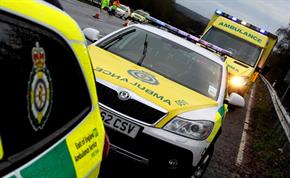
A number of England’s ambulance services are currently trialling new emergency response times in an attempt to see if it helps them to reach the most serious 999 cases more quickly and cut wasted use of resources.
Under the plans, the services taking part get a longer period of time before the clock starts to appropriately code certain calls.
This is a national scheme that is trying to shape what changes may be needed to clinical responses and ambulance targets in the future. Although we are not currently a pilot site, we, alongside all other ambulance trusts, are providing data for comparison.
Looking at clinical codes
The pilot is now turning to clinical code-sets, in particular looking at what responding category (R2, G1, G2 etc.) is given to each one (stroke, traffic accidents etc.).
We’ve been asked to provide information on hospital pre-alerts, so when a patient is so unwell that we’ve called ahead to the hospital to let them know we’re bringing them in. The aim is to measure whether certain codes or clinical conditions are resulting in a high percentage of hospital pre-alerts. In theory, a high number of pre-alerts for a condition would indicate that these patients are more seriously unwell, and therefore that the response category should be more urgent. Conversely, if a condition results in less pre-alerts it would indicate that its responding category should be less urgent.
Clearly, it isn’t that ‘cut and dry’ for all cases, but the data gathered across the country should help to identify any themes – and help shape what patients are prioritised moving forward.
What do we need you to do?
A hospital pre-alert is done directly by the crew who is with the patient. This is absolutely how it should be done, but it can make it difficult to capture the data that’s needed.
But – there is a functionality to record it on ePCR. Although it doesn’t prompt you for it, you can manually select it on the system. Not sure how? Download our handy guide.
So if you pre-alert a patient into hospital and are using ePCR, please remember to record it. You’ll be helping to inform the clinical decisions about our service, and more importantly our response to patients, for the future. Thank you!
Further updates on the national pilot will be shared on Need to Know as new information is shared and released.
Published 5th November, 2015